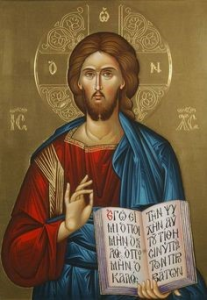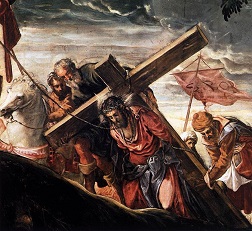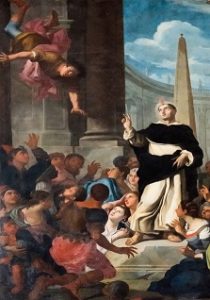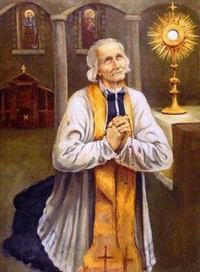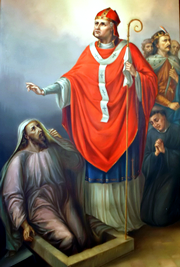
Forgotten War – Part 1 – What War?
“Behold a young nobleman, who was called the life and soul of conversation: where is he now? Enter into his apartment: he is no longer there. If you look for his bed, his robes, or his armor, you will find that they have passed into the hands of others. If you wish to see him, turn to the grave, where he is changed into corruption and withered bones. O God! That body, pampered with so many delicacies, clothed with so much pomp, and attended by so many servants, to what is it now reduced? O ye saints! who knew how to mortify your bodies for the love of that God whom alone you loved on this earth, you well understood the end of all human greatness, of all earthly delights; now your bones are honored as sacred relics, and preserved in shrines of gold, and your souls are happy in the enjoyment of God, expecting the last day, on which your bodies shall be made partners of your glory, as they have been partakers of your cross in this life. The true love for the body consists in treating it here with rigor and contempt, that it may be happy for eternity; and in refusing it all pleasures, which might make it miserable forever.”
How beautifully St. Alphonsus Maria De Liguori, in his book, “Preparation for Death,” put our short time one earth into the proper perspective. If it was up to me, considering how short our trip in this valley of tears is compared to the lifespan of our soul (eternity), I would change the title to “Preparation for Real life.” Why real life? The answer is quite simple: many of us live fake lives. We have medicines and remedies for every occasion, a cushion for every situation, eliminating or at least minimizing the consequences of our own actions.
Perhaps a better title would be “Preparation for departure.” From the Gospel and teachings of the Church we learn that our soul will end up in either heaven, or hell. Would it not be more honest and realistic to say: “there are two destinations: hell and heaven.” Why hell first? It is simple, to enter hell there is no test, no requirements, and no work needed. Heaven on the other hand is only for those who prove themselves “worthy of the promises of Christ.”
We learn about hell from the gospel of Luke 16:22-24 22
“When the poor man died, he was carried away by angels to the bosom of Abraham. The rich man also died and was buried, and from the netherworld, where he was in torment, he raised his eyes and saw Abraham far off and Lazarus at his side. And he cried out, ‘Father Abraham, have pity on me. Send Lazarus to dip the tip of his finger in water and cool my tongue, for I am suffering torment in these flames.’”
How tremendous suffering in hell must be if the rich man is asking for a few drops of water on the tip of Lazarus’s finger. How bad must it be there even if demons don’t want to go there?
Then Jesus asked him, “What is your name?” He replied, “Legion,” because many demons had entered him. And they pleaded with him not to order them to depart to the abyss. [Luke 8:30-31].
On the other hand, we learn about Heaven from the first letter to the Corinthians 2:9.
“What eye has not seen, and ear has not heard, and what has not entered the human heart, what God has prepared for those who love him,”
If we would ask random people on the street where they would prefer to go after death, the great majority would answer heaven. Perhaps some ignorant people will say otherwise, but heaven is the logical answer. If all of us want to go to heaven the question is: why do we entangle ourselves so much in everyday affairs and devote less and less time to know, love and serve God? Isn’t it the only way to heaven? Why do we spend countless hours watching sports and useless movies, and enjoying other forms of worthless entertainment? At the same time we cannot find a mere half hour to read the Bible or the “Lives of Saints.” We know that God’s word is life giving and we should know that the majority of saints were inspired by previous saints. For example, St. Augustine was strongly influenced by St. Ambrose, St. Benedict Joseph Labre also known as: the “Beggar of Rome” was inspired by St. Alexis, while St. Jean Marie Vianney, even in his later years, liked to read the lives of saints before going to bed for an hour or two of rest in his busy day.
Why do we spend so much time trying to secure a good living, fame, recognition, nice cars, beautiful house, and fancy clothing to create a false image of ourselves to impress others? Why is it that, when we are guiding our children and preparing them for their adult lives we are first concerned with their career, income, good living and so forth? Why do we decide to act contrary to the will of God? Why is “our daily bread” not enough? Why are we dissatisfied with what we are given? Why is there this uneasy feeling in our hearts when a Good Samaritan warns us that our actions are bad? He did not trespass against us, so why do we try to excuse ourselves or cover up our wrong doing? Why is it easier to persuade people to do foolish things than righteous ones? Why do we lie to others and ourselves, creating our own reality, when we know that “the truth will set you free” [John 8:32]. Finally, why do we create a false image of God and an image serving us, an image of an unjust God? Why an unjust GOD? Because everyone expects to go to heaven but few are willing to work for it. The answers to all those questions is simple: we either do not know or realize the simple truth that we are in the middle of a war, a war for our souls, or we are unwilling to fight that ancient war.
Forgotten War – Part 2 – A Huge Mistake
“A huge mistake of the modern pastoral care is that it does not explain clearly the problem of the Church and of Christian life: God, the Supreme Good! Satan, the Evil! And between them, the man who is the subject of constant struggle.” / The message of Jesus to the priests- Satan to monkey God – Ottavio Michelini/
To be victorious in this war it is necessary to recognize the enemy, his power, weapons, and tactics. How many of us believers ever considered our voyage in this world as a war, a battle for our souls, and recognize Satan as our enemy, and more importantly, how many are willing to fight him? From the Bible we learn about the existence of the devil and evil spirits, our Lord himself casts out evil spirits from people on many occasions and commanded His apostles to do the same.
On June 13th, 1976 our Lord talked about this to Father Ottavio Michelini.
EXISTENCE OF SATAN IS TRUE FAITH
Jesus: Think, my son, on this truth: the whole of Revelation, and especially the Gospel, speaks clearly about the existence of Satan and his hosts. This is true Faith. To deny this truth is heretical. Refusal to teach this truth is also heretical. Heretics are therefore those who maliciously deny this reality, the truth of the Faith. To deny the existence of the devil entails a denial of man’s fall. Denied then the creation of original sin, and therefore the redemption and the need for the Church. To deny the existence of Satan destroys Christianity because it rejects to the beginning the creation of man and the purpose of his life. To deny the existence of hell is to deny not only the revealed truth, but to deny the actual reality and it will not be possible to accept any explanation of these phenomena that are and will occur, and which, in human terms, cannot be explained without the influence of Satan. Is it possible that the priest could lead to unbelief, without the ill effects of Satan? Satan is always the creator of the terrible sin of irreligion.
/ The message of Jesus to the priests – Ottavio Michelini/
The existence of Satan is a fact. If God created us in his own image (Genesis, chapter 1:25-27) and God is good and everything that he created is good then how can we explain this:
July 20, 2012
Inside of a Century 16 movie theater in Aurora, Colorado, during a midnight screening of the film The Dark Knight Rises. A gunman, dressed in tactical clothing, set off tear gas grenades and shot into the audience with multiple firearms. 12 people were killed and 70 others were injured.
December 14, 2012
A gunman forced his way into Sandy Hook Elementary School in Newtown, Conn. and shoot and killed 20 first graders and six adults. The shooter, Adam Lanza, 20, then killed himself at the scene. Lanza also killed his mother at the home they shared, prior to his shooting rampage.
June 7, 2013
John Zawahri, an unemployed 23-year-old, killed five people in an attack that started at his father’s home and ended at Santa Monica College, where he was fatally shot by police in the school’s library.
September 16, 2013
12 killed, 3 injured: Washington, D.C.
Aaron Alexis, a Navy contractor and former Navy enlisted man, shot and killed 12 people and engaged police in a running firefight through the sprawling Washington Navy Yard.
May 23, 2014
Isla Vista, Calif. Elliot Rodger, 22, meticulously planned his deadly attack on the Isla Vista community for more than a year, spending thousands of dollars in order to arm and train himself to kill as many people as possible. Rodger killed six people before shooting himself.
October 1, 2015
At the UCC campus near Roseburg, Oregon. Christopher Harper-Mercer, a 26-year-old enrolled at the school, fatally shot an assistant professor and eight students in a classroom. Seven to nine others were injured. He committed suicide by shooting himself in the head.
All these mass shootings, the preparations, planning, and efforts necessary to carry them through suggest some kind of intelligent force behind them. Some may say that those people are mentally ill, crazy. Then how can we explain systematic genocide of unborn babies, gay marriages and others abominations forced on us and our society.
The first letter to the Corinthians, 12:3 “Therefore, I tell you that nobody speaking by the spirit of God says, ‘Jesus be accursed.’ And no one can say, ‘Jesus is Lord,’ except by the Holy Spirit,” teaches us about the great influence spirits have on us. If we meditate on this a bit more we may come to the conclusion that many of the things going through our minds may not necessary come from us. Through our entire life we are conditioned by evil spirits, they don’t have to influence us directly, they will use other people, our parents, friends etc. That why when we grow up we spend so much time trying to secure a good life, fame, recognition, nice cars, beautiful house, and fancy clothing to create a false image of ourselves to impress others, etc.
Satan knows more about us than we know about ourselves, and in his attempts to drag us to hell he will use anything he can put his spiritual claw’s on. Knowledge of our past often is used against us. Nostalgia, reunions (and other forms of reaching to the past), combined with family problems (these problems don’t need to be real), planted in our minds, in our heads, in our hearts, dissatisfaction with our current situation and everyday challenges may lead to physical or mental sin. Satan knows not only what we have done, but what have we have seen and can use our imagination against us. That’s why in the gospel of St. Matthew 18 and Mark 9 such drastic terms as “cut off your hand,” “cut off your foot,” “tear out your eye” are used, to warn us to avoid any temptations or circumstances lading to temptation.
Probably the weakest point in our defense against Satan are our emotions, that is the Stradivarius the devil plays the most on “For from the heart come evil thoughts, murder, adultery, unchastity, theft, false witness, blasphemy” our Lord says in Matthew 15:19.
The heart is the center of our emotional life, love planted by the Holy Spirit, hate by the evil one. Thats why it is extremely important to keep guard over our thoughts and tongue, as it is written in St. Ambrose’s prayer before Mass.
We must realize and remember that the enemy is not the person we have a dispute with, if a husband and wife would remember that behind every confrontation and argument is Satan, pitting us against one another they would stop fighting each other and by fulfilling their marriage vows unite against the common enemy.
We may learn more about Satan from the story of Kevin Hines. On September 24, 2000, he jumped off the golden gate bridge when he was 19 years old. Before the jump he was paranoid and hallucinating, but what is most important is what happen after the jump.
“Regarding his thoughts after jump, Hines stated, there was a millisecond of free fall. In that instance I thought, what have I just done? I don’t want to die. God, please save me.”
Maybe Satan decided that his job is done and let Kevin loose too early, or more likely God in His goodness didn’t let the devil finish his job. In the Gospel our Lord often points to power of faith, and this time faith saved Kevin, our Heavenly Father answered his prayer, he survived the fall.
Pride push Lucifer and others fallen angels to rebel against God, he became full of hate, a deceiver, and liar. Since Lucifer was the first rebel, obedience and respect for the order establish by God is extremely important to be successful in the war for our souls. Humility is another weapon, the search for the objective truth will help, one more we have is to fill our hearts with faith and love, love of God and neighbor leaving no room for wandering unclean spirits, and always remember who the real enemy is.
Forgotten War – Part 3 – Monkeying God
“Beware of false prophets, who come to you in sheep’s clothing, but underneath are ravenous wolves. By their fruits you will know them. Do people pick grapes from thornbushes, or figs from thistles?”
(Matthew, Chapter 7:15-16)
“There can be no genuine solution of the social questions apart from Gospel”.
(St. John Paul II, Centesimus annus)
Previous paragraphs were about the influence the devil may have on an individual person by manipulating their thoughts, emotions and thinking processes. Now let us analyze a more sophisticated form of manipulation, this massive manipulation is intended to destroy faith, especially Christianity, and change our culture.
Under the banner of progress he is slowly working to replace the traditional structure of society with a new, “better” one. To succeed, he has to destroy the family. To do this he employs a vast army of servants, better known as “do-gooders.” These deeply disturbed and confused people, act on emotions and for this reason are easily manipulated by evil forces.
The attack started at the beginning of the 20th century when progressive era was proclaimed. In Europe it manifested itself in the 1917 communist revolution in Russia, followed by the rise to power of Adolf Hitler in 1933 in Germany and the introduction, by F.D.R. and his wife Eleanor, of social services and feminism in United States. We all know of the evil of Communism and Nazism (National Socialism), but not many can recognize the evil within the “equal rights” for woman movements or the Social Security program.
Who caused more damage, the president or the first lady? Let’s start with the first lady, wildly recognized as the mother of the Feminist movement. We all know that the first promotor of feminism was the snake (Satan), not Eleanor. Eve under the influence of the snake took matters into her own hands and started to rule the Garden of Eden. She ate the forbidden fruit herself first then she presented it to her spouse Adam, we can assume that she said: “Honey I ate the forbidden fruit and I’m fine, why don’t you have some too?” and poor Adam fell into the trap. In the 20th Century the trick with a snake wouldn’t work so easily, so he used the first lady. The old Polish proverb at work, “when the devil can’t do it, he will send a woman.” The effect of Eleanor’s Feminist agenda is that today everyone is afraid of being called anti-women or “sexist.” “Happy wife happy life” is the standard in most households. Women pursuing professional careers do not have the time for their family and kids. They don’t have time to pray, to go to church, and tend to rely on the government. Raising and teaching kids is shifted to public schools.
The Feminist movement, which plants the seed of pride in the hearts of women, is a sneaky attack on the order established by God and his plan for the salvation of our souls. The traditional structure of family is not standard anymore. Fewer and fewer people are getting married and more are getting divorced.
At the same time F.D.R. came out with something called the “New Deal” which created the Social Security plan. Originally started as a program to help those who were unable to provide for themselves, but it quickly became mandatory for everyone. Before S.S., old people, when unable to work, would rely on their kids to take care of them for the rest of their lives. Now they have a retirement plan giving them independence. They do not have to depend on their kids and can enjoy last days of their lives alone. At the same time their kids are released from their responsibilities towards their parents coming from the 4th commandment. In effect young people are building their families, raising their kids without advice and help from the more experienced “old” generation. For this reason they rely more and more on opinions and directives from “experts” in the field. The knowledge and wisdom collected over hundreds and thousands of years is no longer passed on to the next generations and is being forgotten. Grandpa and Grandma are not around to advise and warn their children and grandchildren. They used to be a source of historical Information, passing it from one generation to the next. For this reason it was much harder to manipulate and twist history to create the false narratives necessary to manipulate masses. Worst of all is its negative effect on faith. Older people are typically more religious. They have more time, more experience, and their body is losing its strength. It is a time when many are coming back to God. They pray more and go to church more often. In the old days during those religious practices they would be accompanied by their grandchildren. Grandparents without even recognizing it would plant a seed of faith in their little companions’ hearts. Thanks to S.S. it is happening less and less often. 30 years later another assault against the family started.
The War on Poverty is the unofficial name for legislation first introduced by United States President during his State of the Union address on January 8, 1964. This legislation was proposed by Johnson in response to a national poverty rate of around nineteen percent. The speech led the United States Congress to pass the Economic Opportunity Act, which established the Office of Economic Opportunity (OEO) to administer the local application of federal funds targeted against poverty.
The Economic Opportunity Act of 1964 which created the Community Action Program, Job Corps and Volunteers in Service to America (VISTA), centerpiece of the “war on poverty” – August 20, 1964
Food Stamp Act of 1964- August 31, 1964
Elementary and Secondary Education Act – April 11, 1965
Social Security Act 1965 (Created Medicare and Medicaid) – July 19, 1965
The Office of Economic Opportunity was the agency responsible for administering most of the War on Poverty programs created during Johnson’s Administration, including VISTA, Job Corps, Head Start, Legal Services and the Community Action Program. The OEO was established in 1964. The OEO launched Project Head Start as an eight-week summer program in 1965. The project was designed to help end poverty by providing preschool children from low-income families with a program that would meet emotional, social, health, nutritional, and psychological needs. Head Start was then transferred to the Office of Child Development in the Department of Health, Education, and Welfare (later the Department of Health and Human Services) by the Nixon Administration in 1969.
President Johnson also announced a second project to follow children from the Head Start program. This was implemented in 1967 with Project Follow Through, the largest educational experiment ever conducted.
22 trillion dollars of taxpayers’ money was spend, and poverty rates are no different than fifty years ago. If somebody thinks that the money was wasted, he is wrong. It was used to further diminish the role of the traditional family in society. Welfare and other social programs are creating classes of people permanently dependent on the government. Single mothers are preferred, and having husbands creates the risk of losing assistance and for this reason the program discourages the traditional family structure and promotes sexual activity outside of marriage, promoting sin.
To change society you have to divide it, then it can be conquered. The easiest way to achieve this goal is to start as early as possible, through the indoctrination of children in the public school system where separation of church and state is used to promote paganism. Education taken over by the government removed God as Creator and replaced Him with Darwin and his theory. Curriculum in social studies deliberately omits massive quantities of information, being purposefully confusing rather than educating. The learning process is guided by the progressive agenda, political correctness, speech code, gender equality, and on the top of it demoralizing and confusing sexual education.
Colleges and universities became the factories of paganism, where the spongy minds of young people are poisoned with evil communist, socialist, and progressive ideas. Public education system took over teaching of the young generation. 100 years ago almost every catholic parish had a school and many of them were free of tuition for parishioners’ children. Today the number of those schools is shrinking rapidly. Parents have to pay twice, through taxes to support public schools and tuition in the private one. As a result, the faith of young people is weakened, fewer of them regularly attend mass and even fewer believe in God.
The Commandment to love God and our neighbor obligates us to be charitable, to help our neighbor in times of need. Poor people are a gift from God, they are given to us so we can help them and create a Godly bond of love between giver and receiver. This kind of charity is self-regulating if done to help others stand on their own two feet, guided by the wisdom from an Italian proverb: “give a man a fish and you will feed him for a day. Teach him how to fish and you will feed him for his life.” Done for the love and Glory of God.
Charity run by the government should be called the “Redistribution of Wealth” and in reality is legalized theft. It doesn’t require any effort from us, many times it is done against our will, and for this reason lacks spiritual benefit and has no value in God’s eyes. It creates bureaucracy with countless regulations and waste. Faceless programs corrupt the hearts and minds of recipients, donors and the bureaucrats between them.
The mentality of entitlement is created in the minds of a majority of recipients. Scamming the system as much as possible has become the rule. Having a lot of free time on their hands provides more opportunities to get involved in sinful and criminal activities.
On the other side we have hardworking taxpayers witnessing corruption, the wasting of their money and demoralization of those on public assistance. They don’t see people on public assistance as needy helpless children of God anymore, and the love of neighbor is gone.
Satan knows that the universal destruction of the family is not possible as long as the world is a collection of independent countries.
Since the tower of Babel human-kind is divided, there is a reason for the existence of autonomous countries and nations. Each of them having their own structure, rules, regulations, governments, many speaking different languages. By creating them God makes Satan’s goal harder to reach. He put barriers blocking and slowing down his evil plan. Each country, because of its independence may learn from the mistakes of others and avoid them, they can create alliances against progressing evil, like during WW I and WW II, the NATO pact etc. To corrupt all of them at the same time requires the existence of a global government, global dictatorship. Likewise, the Catholic Church is structured to prevent total corruption too. Pope, the Vicar of Christ, is the head of the Church, which is subdivided into dioceses run by Bishops, and each diocese is a collection of parishes run by pastors. The Pope rarely gets involved in the affairs of diocese and similarly bishops rarely influence parish affairs.
In 1993 after the collapse of the communist bloc, the European Union was created. Some say it’s to balance the domination of the US. In reality the European Union limits the independence of its members, creating a centralized government, with its own monetary system. Its influence on member countries is so severe that after 23 years, England, one of the founders decided to leave. For most of this time the EU was run by people with communist or socialist connections. For example, the acting president Donald Tusk is a member of P.O. (Citizens Platform), uniting soft-core communists and socialist politicians in Poland.
On the other side of the globe, the United States is under assault to submit its independence to the UN, to become subordinate to the international court and to acquiesce to environmental and economic treaties.
The US is a unique country built and based on God’s laws and Christian values, and for this reason it is blessed with prosperity. This prosperity is used as pretext to bring down America.
“The U.S. is rich country, we Americans are always ready to help those less fortunate, let us open the borders and invite everybody who wants to come. Let’s share, be compassionate, isn’t that what Christianity is about?” do-gooders say.
Strangely this proposition comes from the same group of people who proposed abortion, “same-sex” marriage, and a socialist system of government as the solution to our problems. In this situation the rule: “Fool me once shame on you, fool me twice shame on me,” dictates a careful approach.
Helping those poor oppressed people is our duty, but bringing them under our roof must be done carefully. We have to make sure that they are not coming to change and destroy America, to take over or exploit it, but to join it. Instead of being African-Americans, Mexican-Americans, Russian-Americans etc. they all will simply be Americans. They must free themselves from the mental corruption that has destroyed their countries of origin, and must be willing to live moral lives, work hard, obey the rules, and cherish America as a gift from God. Massive uncontrolled immigration can easily, and in a short time, destroy the last best hope, the biggest power for good in the world and turn it to the same kind of regime they escaped from. A lack of understanding the causes of U.S.’s prosperity among immigrants makes them easy targets for servants of the devil, with their promises of a utopia, everything for nothing, taking from the “rich” and giving to the “poor,” where you can do anything you want as long as it helps the elites demoralize society and gain more power. Do-gooders promise that in America socialism or communism will work, just give them more control. This propaganda causes the majority of naïve immigrants, who are already brainwashed by the mainstream media, to happily sell their souls for a welfare check.
Destroying the country through massive immigration in order to crush morality – brilliant plan
